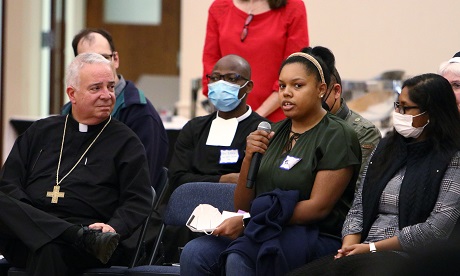Theologians and Catholic Church reform groups are overjoyed lay men and women will be full voting members at the upcoming Synod of Bishops.
This is the first time any Pope has allowed lay people to do this. It is a substantial development, say several prominent experts.
The changes “make the synod more rooted in the nature of the people of God,” says one.
It’s a “notable ecclesiological development”, says another.
“For some time, many ecclesiologists, including me, have been complaining that we did not yet have an ecclesial institution capable of bearing the expectations that Pope Francis’ vision of a synodal church brings.
“We are now much closer to that reality.”
The changes
- 70 non-bishop members (about quarter of synod members) will participate in this October’s synod of bishops in Rome.
- Half the non-ordained members will be women.
- 10 elected male religious participants will be reduced to five; five female religious will be elected.
This is important, says one theologian. It will force the Church to discern all the voices it needs to hear, she says. “Although the changes don’t alter Catholic doctrine, they are “expanding participation.”
The synodal process needs these voices when examining how the entire Church can live in community, she says.
Another theologian says the new balance of ordained and non-ordained members will help bishops realise “they are first and foremost part of the people of God, not above or outside it.”
The changes will help the whole Church more fully embody the concept of synodality. “It’s not a revolution, but it is an evolution of the synod,” says a Church historian.
However, consultation notwithstanding, the Pope is the final decision-maker, he cautions.
“This is not the beginning of a democratic church.”
Eliminating the auditor’s position or those of issue experts is concerning, he says. It could change the dynamic of synod discussions which have established processes.
Lobbying for change
The Vatican’s decision to include lay women as full members in the synod comes after years of lobbying.
One reform advocate is looking forward to having “lots of important conversations … we haven’t been able to have for several decades now.”
These include women’s “full and equal participation in all aspects of Church life” and better inclusion for LGBTQ+ persons.
“Pope Francis is taking very seriously the call to enlarge the tent, [but] there’s still a ways to go …” she says.
She’s concerned, however, there is no specific mechanism that ensures lay people – like those raising families – would be adequately represented.
Many advocates are lobbying for full gender parity at the synod.
Unanswered questions
One commentator asks if October’s meeting can be called a Synod of Bishops with so many non-bishop members.
He also questioned whether the changes would apply in all future synods.
Another wonders how the non-ordained members of the synod would be chosen. It’s important to include diverse voices – women, LGBTQI people, Catholics of colour, disabled Catholics … and others “excluded from this process for so long,”.
“There is still a real danger that this more expanded membership will be stacked with ‘safe’ voices,” another says.
However, Francis is making it clear a synodal church needs more than male clerics’ voices, says yet another.
“We certainly see the hand of the Holy Spirit throughout the whole process,” she says.
Source
